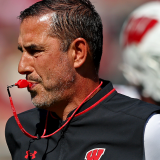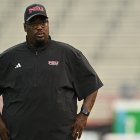Will the 2020 college football season be canceled? Coaches, ADs weigh possibility and impact
The potential of not playing college football in 2020 exists, whether you want to admit it or not
What was once unthinkable has quietly become a discussion point and concern throughout college athletics. Will the coronavirus pandemic force the cancellation of the 2020 college football season?
With it already having taken out the NCAA Tournament and the remainder of 2019-20 season, including the College World Series, athletic departments are looking ahead to football as the next major event on the collegiate sports calendar.
"I am not trying to be overly pessimistic, but I'm doubtful we're going to have a 2020 football season, NFL or college," said Warren K. Zola, a respected expert on sports law and executive director of Boston College's Carroll School of Management. "That's just me. I don't think it's a foregone conclusion that we're all back over the summer."
From a view more than five months from kickoff on Aug. 29, that concept is hard to comprehend.
Just pause for a moment and consider where we are right now as a country with the coronavirus. With 72 percent of Americans believing containment will take a few months or longer, 57 percent say the battle with the coronavirus is "going badly," according to a CBS News poll. There are currently 55,330 confirmed cases in the United States with 804 deaths, and neither the testing rate nor the infection rate has reached its peak.
Now imagine, five months from now, jamming 100,000 fans on a steamy Saturday afternoon into a stadium to watch 22 men in close proximity on any given snap running 150-plus plays.
That's the furthest thing from social distancing.
It hit Texas A&M athletic director Ross Bjork this week when the 2020 Tokyo Olympics were postponed. That event was set to take place roughly a month before the start of the college football season (July 24 to Aug. 9). Olympic officials finally concluded it was not wise for 11,000 athletes from all over the world to congregate for two-plus weeks.
"With that news right there, then that starts creeping into the football season and training camps and scheduling," Bjork said. "… I don't know how you operate [if the season is canceled]. Where would the bailout come from? Because we would all have to have one if we were going to maintain any sort of normalcy."
Since about March 12, when the NCAA Tournament was canceled, the nation in general has been hunkered down facing a new normal: trying to stop the spread of the coronavirus.
That has left college athletic programs pondering the possible loss of their top revenue generator. The cancellation of the 2020 college football season -- or even a drastic reduction in its games -- would dwarf missing out on a month of March Madness. Football is the nation's most popular sport. The country's attachment to it -- economically and emotionally -- cannot be underestimated.
College football as an enterprise accounted for $6.5 billion in revenue during the 2018-19 academic year, according to Andy Schwarz, a partner and consulting expert with California-based law firm OSKR. That's an average of $51 million per school.
In general, 80 percent of FBS athletic budgets are made up of football revenue.
"Just the thought of it, I think we're all thinking about [losing the season]," Georgia AD Greg McGarity said. "Now, what does that mean? That's what is going to be defined here over the next two or three weeks."
Or more.
Spring practices and spring games are already canceled. Players have moved home to study remotely. Recruiting activities have been suspended, too.
After the semester concludes, what's next?
Coronavirus cases are multiplying at a dizzying rate in hot spots like New York. Obviously, there is no assurance the practices lost this spring will be made up in the summer … nor whether players will even be able to assemble in a group before fall camp begins … if it begins at all.
Virginia coach Bronco Mendenhall already said he is open to a "modified season."
North Carolina coach Mack Brown recently told reporters, "There is a fear of, 'Would we have a season?' Would we have a partial season? What does a partial season mean?' There is a great concern because of the remedy that comes in with football."
"I just told our staff this is like a war. It's like a natural disaster. We have to treat it as such," Brown said in a separate interview with CBS Sports.
Asked about the season being impacted, Utah's Kyle Whittingham told The Athletic, "I think there's absolutely that possibility, as much as I hate to say it."
There is no central authority for college football. If there are cancellations, they will likely come ad hoc from the conferences.
Whatever happens, college football is most likely to take its lead from the SEC. Asked directly last week whether a complete season would be played in 2020, commissioner Greg Sankey said, "I'm a half-full person, so I have optimism."
Twice in the last week, Sankey has referred somewhat cryptically to "contingency plans." Asked to define those plans on "The Paul Finebaum Show," Sankey said, "Not yet, simply because the focus is on next year as scheduled. … There will be a time to figure out what that means."
"I think you always have to have contingency plans as much as possible," Florida AD Scott Stricklin said. "I'm optimistic [that], because of the dramatic steps everyone's taken, we're going to be able to have a sense of normalcy."
Stricklin raised eyebrows when he previously told the Orlando Sentinel: "[Not playing] will shake the foundation of college athletics. As everyone knows, football pays for the enterprise to go forward."
One example of the impact: Georgia's $176 million athletic budget is the sixth-largest in the country. That means football is responsible for $141 million of that total (80 percent).
"If we just had more clarity on when the all-clear horn is going to sound, that certainly helps," McGarity said. "That's what nobody really knows right now. It would be irresponsible to say that we feel good about [starting practice] Aug. 1. … You don't want young people to all the sudden get their hopes up."
"Mr. College Football" Tony Barnhart has covered the sport for everyone from CBS Sports and the Atlanta Journal-Constitution to the SEC Network. He is a national voice for college football and a prominent one in the South. For the last 30-plus years, Barnhart has attended the Florida-Georgia game with his fraternity brothers.
When the mere prospect of there not being a season was raised last week, Barnhart said, "My fraternity brothers were not happy. They said, 'Listen, you can do what you want to do, but you cannot mess with our Florida-Georgia game and don't mess with college football.'"
"Will we get through it?" he added. "Yes. But the psychological blow of not having a college season in my part of the world would be significant. The thought of not having it would be tough, tough to handle."
CBS Sports spoke with several coaches and administrators on the subject.
Some were optimistic. "I gotta look at it like we're going to have a season," Louisville coach Scott Satterfield said. "We're going to get this thing in."
Some were whimsical. "I saw somebody said, 'If you threatened college football season, everybody in the South would lock themselves in their house for two weeks to get it over with,'" Stricklin said. "I kind of feel like we're not far from that. I think people are really taking it seriously."
Some were philosophical. "I don't want to be an alarmist, but there a lot of realities that are going to result," McGarity said. "Just like your 401K [and] mine. All the money we saved in our investments are affected."
Some were matter of fact. "I think we will [play]," Mississippi State coach Mike Leach said. "We've got to follow the medical people and what they think. The biggest thing, the scariest thing, is the unknown. They don't know the full dimension of this."
Try selling season tickets in these uncertain times. Several schools have extended renewal deadlines for obvious reasons.
"One or two things could drive that [interest] down," Stricklin said. "One is people don't think [the season is] going to happen. I don't think we're at that point."
Try raising money for facilities. Florida and Georgia are well down the road in raising funds for building major athletic projects.
Never mind any existing shortfall. There may be issue of re-recruiting donors who have already pledged.
"Those are all gifts," McGarity said. "They're not obligated by law to make those gifts come true."
There is uncertainty everywhere.
For now, we'd all settle for the season coming true.


















